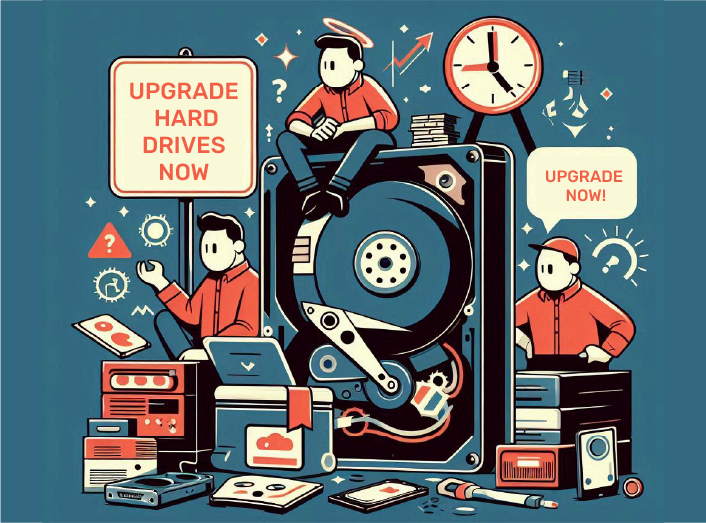Published on: September 17, 2024 | 5 minute read
Is your computer running slow or crashing suddenly? Perhaps it's time for an upgrade? Discover the signs of when to Upgrade Your Hard Drives. Protect yourself from data loss and help optimize system efficiency. Keep your system running smoothly with our help.
Here are 4 indicators that you need to replace your drives:
1. Decreased Performance and Slowdowns
One of the most instant warnings that you need an upgrade is a sharp deterioration in performance. Your computer takes forever to boot, applications are slow, or even file transfers seem sluggish; your hard drive could be the reason. Keep in mind, the move from an HDD to an SSD can dramatically increase speed!
2. Frequent Crashes and Freezes
If you notice that files are becoming corrupted or you encounter errors trying to access certain data, your hard drive might be developing bad sectors. Bad sectors are blocks inside your drives that cannot be reliably read or written, and there aren't many of them before a failure occurs. Consistently running disk diagnostics will expose those, and most importantly, when these issues start becoming frequent, that tells you it's time for a replacement.
3. Unusual Noises
A hard drive that makes strange noises, such as clicking or grinding sounds, is a serious warning sign. These noises often indicate mechanical failure or imminent drive collapse. If you hear these sounds, it’s crucial to back up your data immediately and replace your storage.
4. Insufficient Storage Space
You may have gathered data files over time, which is common but can slow down your system. Check for available space as your current hard drive may not meet all your needs. Get a larger hard drive or look into getting a higher-capacity SSD. Avoid the need to frequently delete files or transfer them to external storage to free some space.
Conclusion
Identifying these signs can help decide when to upgrade your hard drive and prevent future data loss and system failures. Slower performance, strange noises, or lack of storage space are preventable. Although they should be addressed quickly to ensure a more seamless and efficient computing experience. Getting yourself an SSD can provide significant performance enhancements during crucial times like these.
FAQs
Q: Should my hard drive be upgraded often?
A: The frequency of hard drive upgrades depends. A good rule of thumb is upgrading every 3-5 years. Sooner if you experience performance issues.
Q: Could I do upgrades from an HDD to an SSD if I wanted?
A: Yes. HDD to SSD upgrades are common DIY projects. But first, back up your data, clone your existing drive if needed, and follow a guide or tutorial specific to your computer model.
Q: Is upgrading to SSDs any good?
A: SSDs can provide you with faster boot times, quicker file access, and better system responsiveness. They are also generally more durable than traditional HDDs with noticeable improvement in overall performance.
Q: How can I check if my hard drive is failing?
A: You can use diagnostic tools such as CrystalDiskInfo or built-in utilities like Windows Check Disk to assess the health of your hard drive. Look for signs such as bad sectors, high temperatures, or error messages.
Q: What should I do with my old hard drive?
A: Consider securely wiping the old drive before disposal to protect your personal data. You can also repurpose it as an external drive or donate it to organizations that refurbish hardware.


